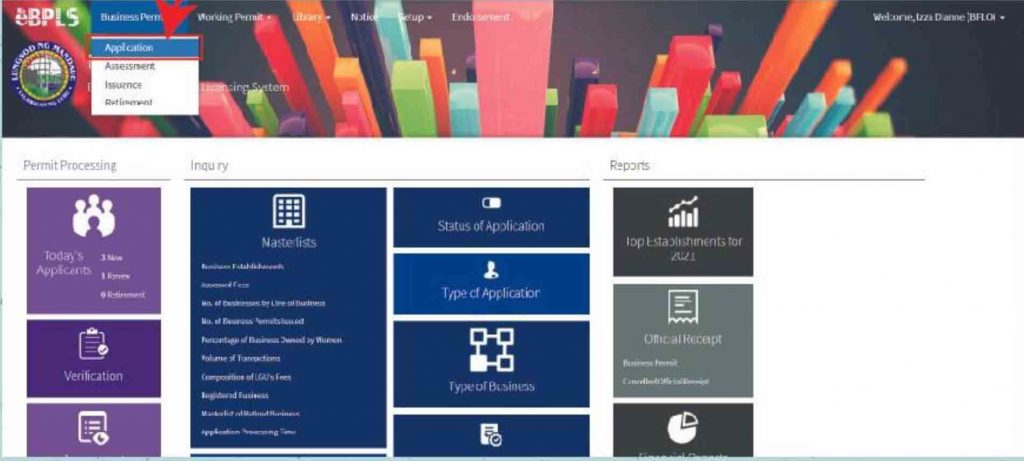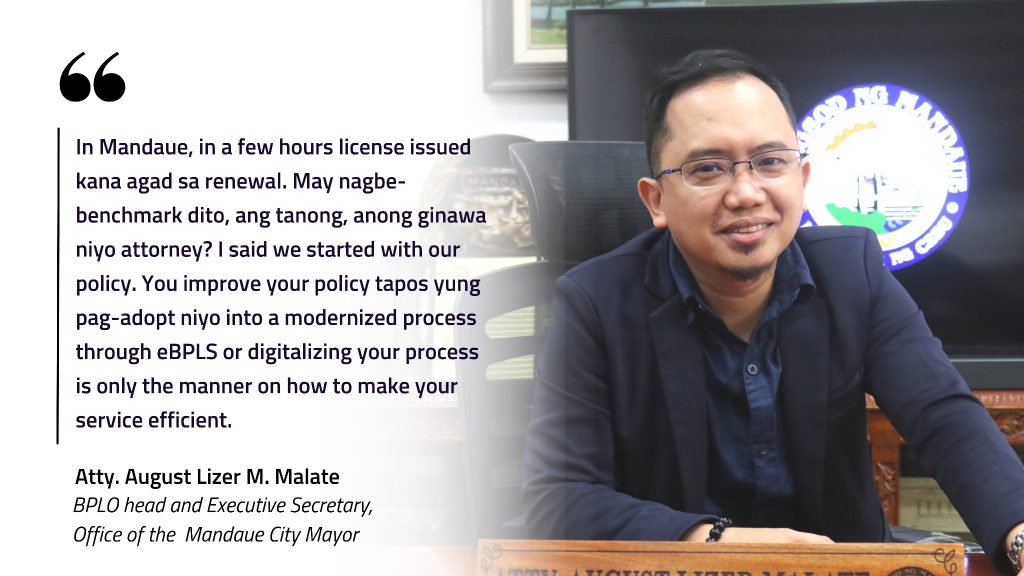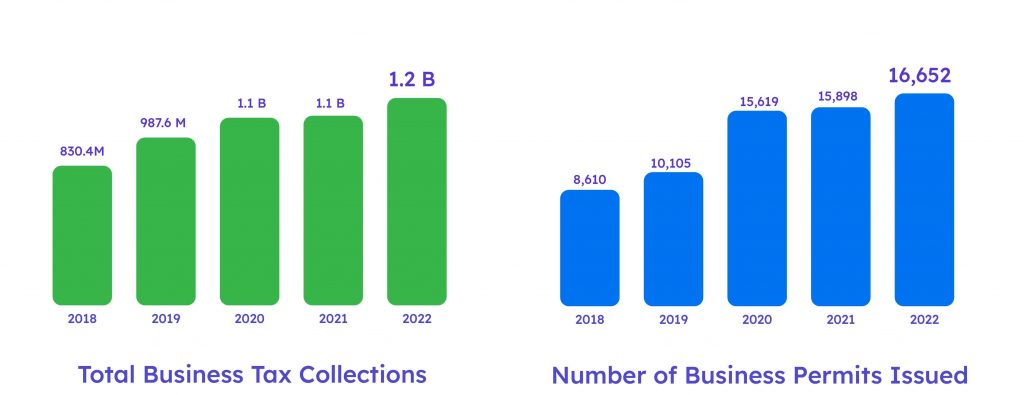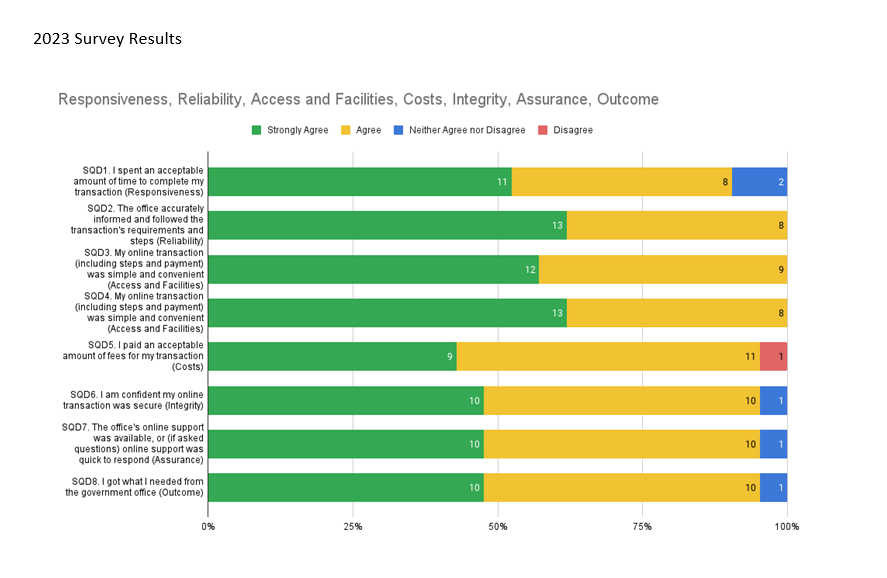Overview
The electronic business permit and licensing service (eBPLS) is an application developed by the Department of Information and Communications Technology (DICT). It is a free system given to local government units (LGUs) to assist in business permit processing.
Launched in December 2020 and fast-tracked by the ongoing pandemic, Mandaue City is the first highly urbanized city in the Philippines to adopt the system.
The eBPLS aims to enhance the efficiency and transparency of business transactions in Mandaue City. It enables end-to-end online processing from application to payment and permit release. The system provided businesses with perpetual access to their information, tax records, and payments while reducing the need for face-to-face interactions.
The eBPLS successfully streamlined the process, making it faster, more convenient, and transparent for business owners in Mandaue City.
Challenge
Mandaue City’s eBPLS was implemented to address the main productivity challenge of manual and time-consuming business permit processing. Prior to the introduction of eBPLS, the city government relied on traditional paper-based systems, resulting in delays, inconvenience, and burdensome business permit process. The manual handling of documents and the need for physical presence for each step – from application to payment and permit release – created significant administrative burdens for both the business owners and the city government. During the January 2021 business permit renewal, processing stood at an average of 18 days.
This outdated process not only consumed valuable time and resources but also hindered the city’s ability to attract investments and promote economic growth. The lengthy processing time and lack of transparency in the system discouraged potential entrepreneurs and hindered existing businesses from expanding their operations.
By adopting the eBPLS, Mandaue City aimed to streamline and automate the business permit process, making it faster, more convenient, and transparent for all stakeholders involved. The system aimed to eliminate paperwork, reduce processing time, and provide online accessibility for business owners, resulting in increased productivity and efficiency in obtaining permits and licenses.
Solutions
The eBPLS addresses the challenge of slow business permit processing in Mandaue City. Through innovative solutions, the system introduces several groundbreaking features that revolutionize the process and improve efficiency. Here are the key features implemented:
- Online application that enables businesses to submit their permit applications online, eliminating the need for physical visits and paperwork, thus saving time and resources.

- Integrated processing of various permits and clearances, such as business permits, barangay clearances, building permits, and certificates of occupancy, streamlining the overall process and reducing duplication of efforts.
- End-to-end automation from application submission to payment and permit issuance. Automating the entire permit processing workflow helps in ensuring efficiency, accuracy, and faster turnaround times.
- Secure and centralized database that allows businesses to store and access their information, tax records, and payment history conveniently, facilitating future renewals and reducing data redundancy.
- Online payment options that enable businesses to settle permit fees electronically, improving convenience, and eliminating the need for manual payment processing.
- Data analytics capabilities provide insights and trends on permit processing, allowing the city government to make data-driven decisions and optimize their services for businesses. According to Atty. Marmie Dyan Deniega of BPLO Mandaue, the selling point of the eBPLS is its online capacity which helped improve their service delivery.

The implementation of the eBPLS by the City Government of Mandaue was supported by the following activities:
- Compliance with National Digitization Initiatives: The Philippine Government, recognizing the importance of digital transformation, spearheaded efforts to promote digitalization across all sectors. The DICT played a crucial role in developing the eBPLS software as part of the government’s commitment to enhance public service delivery through technology.
- Crafting of Local Ordinances and Resolutions: The City Government of Mandaue crafted and passed local ordinances and resolutions that specifically addressed the implementation of the eBPLS, such as Ordinance Number 15-2019-1479 , which codified and streamlined the business permit and licensing system. This ordinance provided the legal framework for the implementation of the eBPLS. These legal measures provided the framework and guidelines necessary for the adoption of the new system, ensuring compliance with local regulations and streamlining the business permit and licensing processes. In an interview, Atty. August Lizer Malate, BPLO head and executive secretary to the City Mayor’s Office, highlighted the importance of improving internal policies in implementing eBPLS.

- Needs Assessment and Planning: The city government conducted a thorough needs assessment to identify the challenges and requirements of the existing business permit and licensing system. This assessment guided the planning phase, enabling the government to determine the necessary features and functionalities of the eBPLS.
- Software Development: The DICT, in line with the provisions of Republic Act No. 10844 or the DICT Act of 2015, developed the eBPLS software. This law mandated the DICT to develop, coordinate, and supervise the country’s ICT systems. This involved the design and coding of the system, incorporating key features such as online application, payment processing, data analytics, and document management. Jerry Adolfo, head assessor and licensing officer at Mandaue City BPLO, shares his thoughts for LGUs planning to use eBPLS.

- Training and Capability Building: The City Government of Mandaue provided comprehensive training to its personnel, including the staff from the Business Permit and Licensing Office (BPLO), on the use and administration of the eBPLS. Training sessions focused on system navigation, data entry, customer support, and troubleshooting. Jaylord B. Bugtai, BPLO computer programmer and IT head shares his experience in Capability Building.

- Piloting and Testing: The eBPLS underwent a pilot phase to evaluate its functionality and identify any areas for improvement. Feedback from users and stakeholders was collected and used to refine the system, ensuring its effectiveness and usability.
- Full-scale Implementation: After successful piloting, the eBPLS was implemented citywide. The City Government of Mandaue communicated the launch of the new system to businesses and provided assistance and support during the transition period.
- Ongoing Maintenance and Support: The DICT continues to provide technical support, regular maintenance, and updates to the eBPLS. This ensures the system’s reliability, security, and adaptability to evolving business needs and regulatory requirements.
By implementing these steps and leveraging the innovative features of the eBPLS, the City Government of Mandaue successfully improved productivity and efficiency in business permit processing, making it more convenient and transparent for businesses in the city.
To ensure the sustainability and consistency of the eBPLS, the City Government of Mandaue has enacted several local ordinances. Ordinance No. 15-2019-1479 codifies and streamlines the business permit and licensing system, while Ordinance No. 15-2020-1508 establishes the Mandaue City Business Permit and Licensing Office (BPLO) as a separate department. Additionally, Ordinance No. 15-2020-1589 sets the guidelines for processing business permits and licenses under the “New Normal” and beyond. These local ordinances provide a solid foundation for the continued implementation and success of the eBPLS.
Productivity Gains, Outcomes, and Impact
The implementation of the eBPLS in Mandaue City has resulted in significant measurable productivity gains and positive outcomes for both the city government and business owners. Through the concerted efforts of local officials, the cooperation of the business sector, and support from the DICT, Mandaue City successfully crafted and passed the necessary local ordinances and resolutions to implement the new system.
The intervention has directly impacted the productivity performance of the City Government of Mandaue. The statistics and data indicate a consistent increase in business tax collections. Despite the challenges faced due to the pandemic, the city recorded a slight increase in business tax collections, amounting to Php 909,203,396.88 as of 31 July 2021, compared to Php 900,479,853.78 in the same period in 2020. Furthermore, tax collections from January to June 2022 reached Php 1,040,806,278.12, showing a 16.98% increase compared to the same period in the previous year. These positive outcomes can be attributed to the implementation of the eBPLS, which has streamlined processes and facilitated the efficient collection of taxes. The number of business permits issued has also steadily increased in the past years.

In addition, Councilor Jennifer Del Mar, chairperson on the Trade and Industry Committee of Mandaue City, mentioned how the eBPLS helped the city economically.

The system has significantly improved the turnaround time for processing business permits. From an average of 18 days during the January 2021 business permit renewal, the processing time was reduced to 3 to 5 days by the end of 2021 and further decreased to 1 to 2 days by 2022. This improvement demonstrates the system’s efficiency in expediting the permit issuance process. Furthermore, a recent client satisfaction survey conducted in 2023 revealed that the majority of the respondents surveyed expressed a strong agreement that they spent an acceptable amount of time in completing their transaction, requirements are correctly explained, transaction steps are simple and convenient, and that customer service support is available.

Liaison Officer Ma. Chona Ursal has been submitting business permit applications through eBPLS since 2021. According to her, she has more clients now and she finds it easy and convenient to process permits through the eBPLS.

The innovative features of the eBPLS, such as its online functionality, data analytics capabilities, and online webinars and training sessions, have played a crucial role in its effectiveness. The City Government of Mandaue has actively engaged with stakeholders, including the Mandaue Chamber of Commerce and Industry and its President, Kelie Ko, to ensure a smooth transition to the digital system. As a result, 99% of the clients now apply online, showcasing the high adoption rate and acceptance of the eBPLS.

The success of the eBPLS has attracted the attention of other LGUs, with several visiting Mandaue City to learn about its best practices and seek guidance on implementing similar programs. The documentation and operational handouts are readily available, enabling LGUs to replicate the innovative implementation of the eBPLS in their own localities.
Lessons Learned and Challenges in Implementing the Intervention
One key lesson learned in the implementation of eBPLS in Mandaue City is the importance of comprehensive planning and stakeholder engagement. The city government had to create enabling laws, and facilities, and provide technical training within a short timeframe, which posed significant challenges. Moving forward, a more structured and phased approach to implementation, with ample time for preparation, could mitigate these challenges and ensure smoother adoption.
Another lesson learned is the need for continuous monitoring and evaluation. While the eBPLS has shown positive outcomes, ongoing assessment is crucial to identify areas for improvement and address emerging issues promptly. Regular feedback from business owners and stakeholders can help identify pain points and streamline processes further.
Enhancing user experience and accessibility should be a priority for future improvements. While the eBPLS has achieved a high adoption rate, ensuring a user-friendly interface, clear instructions, and seamless navigation can further enhance its efficiency and effectiveness. Continuous user training and support, including webinars and instructional materials, will empower users and ensure they can maximize the system’s capabilities.
Data analytics, as a key feature of eBPLS, presents an opportunity for further enhancement. Leveraging data insights can enable proactive decision-making, identify trends, and improve overall service delivery. Expanding the use of data analytics can help identify bottlenecks, optimize processes, and facilitate evidence-based policy-making.
Addressing potential challenges, such as technical issues and connectivity, should also be prioritized. Establishing robust technical support systems and exploring alternative solutions for areas with limited internet access can ensure the smooth operation of the eBPLS.
Resources
Integrated Business Permits and Licensing System. City Government of Mandaue. (n.d.). https://cebu.ebpls.com/mandauecity/
Lena, P. (2022, November 9). Iloilo City to go digital on biz process transactions. Philippine News Agency. https://www.pna.gov.ph/articles/1188143
More LGUs adopt online business permit, licensing application system. SunStar. (2021, September 10). https://www.sunstar.com.ph/article/1906873/cebu/business/more-lgus-adopt-online-business-permit-licensing-application-system
Unite, B. (2023, January 25). Mandaue City credits ARTA for improved business tax collection. Manila Bulletin. https://mb.com.ph/2023/01/25/mandaue-city-credits-arta-for-improved-business-tax-collection/
